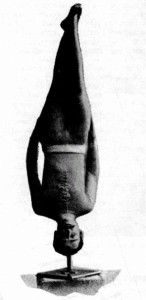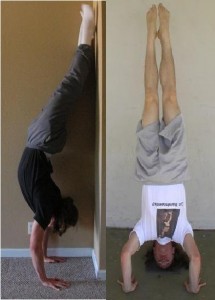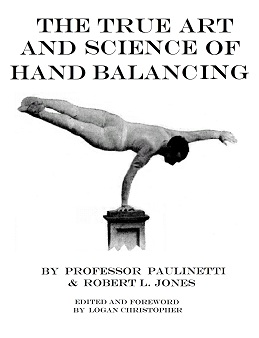I want everyone here to thank Rick Schwarz.
He sent me a copy of a book I’ve been long looking for. The Science of Head Balancing by Professor Paulinetti and Bob Jones.
 Back when I found that original copy of The True Art and Science of Hand Balancing by Paulinetti and Jones, I also saw that they had a book on head balancing. At the time I wasn’t that interested in it, just in learning handstands, so I passed on it. Unfortunately since that time I’ve look for it everywhere I could but to no avail.
Back when I found that original copy of The True Art and Science of Hand Balancing by Paulinetti and Jones, I also saw that they had a book on head balancing. At the time I wasn’t that interested in it, just in learning handstands, so I passed on it. Unfortunately since that time I’ve look for it everywhere I could but to no avail.
But then out of the blue Rick sent me a xeroxed copy of it. It’s much, much shorter then the hand balancing book and unfortunately the picture quality is quite poor. However the information is great.
And you know what? I’m going to put it up on the site for FREE. No strings attached. I just need to retype the work and scan the pictures in.
There are three sections:
The Science of Head Balancing
Head to Head Balancing
The Head Balancing Trapeze
Most people will be interested in just the first part but I’ll put up all three.
Good Luck and Good Head Balancing,
Logan Christopher
P.S. To get you started here is the foreward by Bob Jones
*********************
Forward
The First Two Chapters of this works, on solo and head-to-head balancing, were published by Professor Paulinetti in 1929; that edition is now exhausted (April, 1943) and in reprinting it I am presuming upon myself to add a few words in a place or two, and to supplant his original line drawing illustrations (made from photographs which I took under his supervision) with those actual photographs in figures 12-13-14-15 and to pose for illustrations for the first ten positions (four of which are additions to the original course). Again, thanks to the increased interest in the art, I am adding a chapter on head balancing trapeze as taught me by the great master some fifteen years ago. Under his guidance this was the easiest feet I ever learned, and I trust that you, too, may find it likewise not difficult.
The Professor has answered his last curtain call, but his masterful accomplishments will ever keep his memory aline and his name honored by us of the balancing clan. It is to the memory of the man personally and his spirit of friendly and sympathetic helpfulness that this revised edition is respectfully and lovingly dedicated.
Robert L. Jones
Philadelphia, Pennsylvania
April 18, 1943




 Back when I found that original copy of
Back when I found that original copy of 
